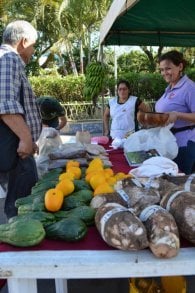By Saulo Araújo, WhyHunger’s Global Movements Program Director
 Members of ATC set up a table for the seeds and products fair in Estelí, Nicaragua. Photo credit: ATC
Members of ATC set up a table for the seeds and products fair in Estelí, Nicaragua. Photo credit: ATC
Today is the International Day of Farmers’ Struggles,La Via Campesina’scall to action for farmers’ seed sovereignty. The day coincides with the 36thanniversary celebration of theAssociation of Rural Workers (ATC), the leading La Via Campesina member organization in Nicaragua.
Last month, led by the ATC, four national Nicaraguan organizations joined forces in the support of food sovereignty and farmers’ rights to multiply and share their seeds. Together, these organizations represent an estimated number of 80,000 rural families in Nicaragua that served as hosts for La Via Campesina’s International Seminar on Peasants’ Seeds in the city of Estelí, 92 miles from the capital Managua.
Nicaragua, one of the poorest countries in the American continent, has been on the economic rebound for years. Nevertheless, the government still scrambles to pay for health care and education costs and many families still live with few resources to feed themselves. The Zero Hunger Program that provided financial support to peasant women barely scratched the surface of food insecurity in the country. Small-scale farmers’ cooperatives, with little cash to run even the most basic operation, have not been able to make a dent on the food supply chain.
Despite their country’s challenges, Nicaraguans have designed some of the most progressive laws in the western hemisphere, including and not limited to: the Food Sovereignty and Food Security and Nutrition Law of 2008 and End Violence Against Women Act of 2012. Nicaragua is also a member of the Bolivarian Alliance of our Americas (ALBA) – a regional alliance between Latin American and Caribbean nations that favors social investments. Even with these progressive policies making headway, Nicaragua still struggles with contradictions from their ties to the DR-Central American Free Trade Agreement (CAFTA-DR) – an agreement that gives political leverage to transnational corporations over local communities’ rights.
Local organizations do not seem intimidated by these contradictions in national and international policies. On the contrary, they have dealt with contradictions and challenges by strengthening alliances between national and international allies. The International Encounter on March 23 and 24, which WhyHunger supported through a small travel grant, brought together approximately 400 farmers from Nicaragua and international guests from Zimbabwe, Sweden, Brazil, Colombia, Mexico, Costa Rica, Guatemala, Mexico, Haiti, and the United States. The two-day meeting included site visits and a seed fair led by local farmers from different states of Nicaragua.
These timely events have been leading up to La Via Campesina’s call to action on April 17, International Day of Farmers’ Struggles, which is focusing on the power of seeds.
Why seeds, why now?
La Via Campesina’s efforts to defend small-scale farmers’ rights to seeds are based on the premise that seeds are the foundation of our food system. In other words, whoever controls the seeds controls the food system. According to ETC Group, “The top 10 companies account for 73 percent of the global market (up from 67 percent in 2007) and just three companies [Monsanto, DuPont and Syngenta] control more than half (53 percent) of the global commercial market for seed.”
Without democratic control over seeds, we will not be able to achieve food sovereignty – the right of local communities to decide their own food policies – and end hunger.
UC Berkeley professor Miguel Altieri, one of the speakers in the event in Estelí, mentioned that there are “350 million farms in the world and 1.5 billion peasants who are responsible for 70 percent of the food produced in the planet. Peasants have preserved 1.2 billion different crop varieties which forms the foundation of world’s food.”
Farmers as well as consumers worldwide are entrenched in this long political war against the privatization of seeds and growing monopolization of seed supplies by few corporations. In the last twenty years, our agrobiodiversity – or the diversity of varieties of the same crop – have reduced drastically. We are now cultivating fewer varieties and the price of the seeds has skyrocketed. It should not be a surprise that marches against Monsanto have sprouted around the U.S., and petitions have flooded the offices in Congress.
The growing interest in the U.S. on eating healthy and supporting local farmers should be fertile ground for a profound social change in our food system. And today, April 17, WhyHunger is joining thousands of farmers and consumers around the globe in the defense of our seeds. We must continue building and supporting alliances domestically and internationally against hunger until everyone is able to enjoy fully their lives, with all the contradictions that might surface, but always with dignity and hope.
Join us in our event today at City University of New York – Grad Center (Room 9204) at 6pm for our panel “Food Justice, Food Sovereignty: Building Global Solidarity towards a Just Food System.” If you are not able to join us in person, please watch it online at





